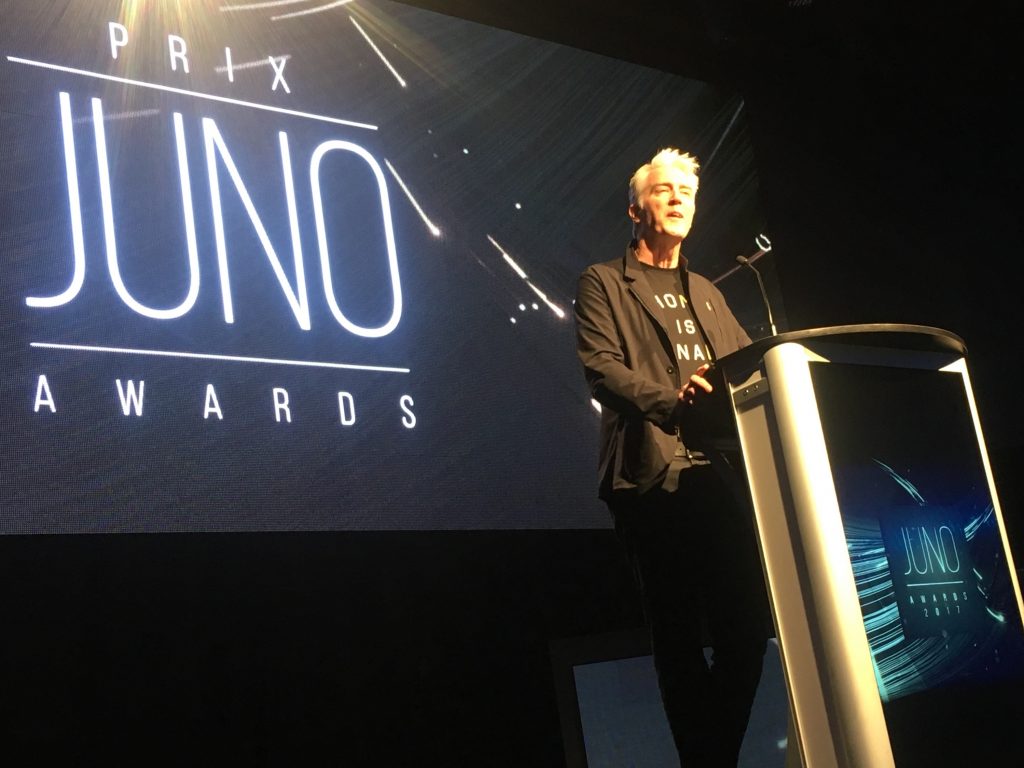Minister Joly, Ministers Beare and James, Mayor Robertson, Mark, Allan, industry colleagues and friends, it is my pleasure to speak to you this evening on behalf of Music Canada.
Before I go any further I also want to thank the BC government for its confidence in the music sector and continued investment. The excitement is palpable. Amplify BC will produce great dividends for BC communities, artists and the broader ecosystem. Thank you.
Tonight I’d like to focus my remarks on the idea of challenging the status quo.
And to underline the importance of action – both individual and organizational.
Music Canada is proud to have made a commitment to leadership in our industry by among other things – refusing to do things one way simply because it’s the way it has always been done.
Our board – Shane, Steve and Jeffrey – and our staff team led by Graham are proud of our efforts to embrace and encourage new ideas with a bias towards action.
But don’t just take my word for it. Let me give you a few examples.
It’s why we did something no one had done before in taking on the issue of Music Cities.
Why in 2011 we began to examine the way municipalities interact with their music communities and how they can grow the music economy for the benefit of the entire city but also specifically for artists and the larger music ecosystem.
Challenging the status quo is why our work resonated and is used on every continent. It has led a dozen cities in Canada alone to begin the process of developing music strategies – most recently reflected in the exciting announcement yesterday by Mayor Robertson.
Our commitment to challenge the status quo also led us to broaden the conversation with provincial governments, stressing the importance of music as a regional economic driver, in addition to a cultural powerhouse.
Our commitment to challenge the status quo is why we won’t give up on our advocacy for quality music education for all young people – no matter where they live, or their family’s income. There are simply too many benefits. The focus on STEM – Science – technology- engineering and math – is deficient. Arts and humanities must be on equal footing. STEAM should be our goal.
Our commitment to challenge the status quo has also led us to help artists voice their concerns and solutions. It’s why we champion the work of the brilliant artist advocate Miranda Mulholland and encourage creators to get involved in the current copyright review.
And it’s why the theme of our JUNOs participation this weekend is our advocacy support for artists at every stage of their career.
One of the biggest challenges for music creators is the Value Gap. In an era of unprecedented music access and consumption, creators are receiving a fraction of what they should be paid for the use of their music, and a middle class of musicians – the JUNO nominees of today and tomorrow – is in serious jeopardy.
But we don’t have to simply accept the outdated laws that contribute to the Value Gap.
The status quo.
No. We should all call upon the federal government to address safe harbours and industry cross-subsidies that undermine a viable marketplace. And we – our friends at SOCAN and other partners – are doing just that.
And finally challenging the status quo is why we’ve begun an organizational review to ensure that we are ready to tackle current issues facing our community and to prioritize the values of inclusion and diversity. It’s why we have led conversations on these vital topics – including last year at CMW’s global forum when we focused on indigenous communities – and at our fall meeting – on gender inequality. We’ll continue the conversation on inclusion and accountability in May at CMW.
Change will not happen naturally. If it did, we wouldn’t be where we are today. In our industry. Or in society. We would not be faced with inequality.
We can’t wait for a natural evolution to occur.
Sometimes change needs to be forced even if it’s uncomfortable and each one of us – as individuals – and as organizations have a responsibility to do our share.
So, to all our partners in the room who are also challenging the status quo, whether by diversifying your boards, mentoring and empowering women or other underrepresented groups to have a greater presence in music production or management, or across nominations categories right here at the JUNOs, we stand with you and we support you. To all who understand the contribution of Canadian artists and believe in the power of music to our economy, our culture and our educational system, let’s continue to work together to create the change we all believe in. Thank you.



Music Canada